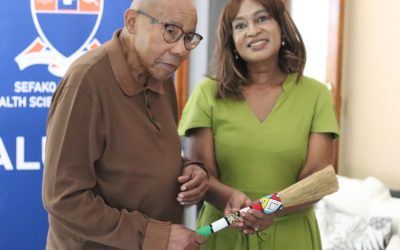Prof Kebo Mokwena, the Head of the Department of Public Health has been awarded the prestigious Research Chair in Substance Abuse and Population Mental Health.
This grant bestows on Prof Mokwena the mantle of a pioneer, as the grant is the first at the SMU coming under the aegis of the South African Research Chairs Initiative (SARChI) of the National Research Foundation (NRF).
“The grant, which is a significant amount, will enable me, among others, to continue the work that I have been doing for the past few years. Although Nyaope is a significant social and health problem in the country, there is little research on it, even though families, communities and society are, on a daily basis, having to deal with the ruin the drug is causing in the lives of the users. Addicts mostly assemble in the streets, taxi ranks, shopping malls and municipal parks. They can be easily identified by their slow movements, slow speech and untidy appearance” Prof Mokwena explained.
Mokwena said the grant will cover the operational and student support costs of the research programme. Key among her plans is to develop a national nyaope prevention strategy, which will need cooperation and collaboration with a number of stakeholders, including NGOs. The funding will also enable her to continue multi- disciplinary collaborations which she has already established with a number of Clinical Departments at SMU, as well as other organisations outside of the University. Current projects include collaborations with the clinical departments of radiology, nuclear medicine, physiotherapy, general surgery, gynaecology and obstetrics, paediatrics and child health, community dentistry, urology, chemical pathology, pharmacology, to mention a few.
Each of these specialities will explore the impact of Nyaope on specific body organs and function of the users and contribute to the body of knowledge around Nyaope. Although mostly master and doctoral students in Public Health will benefit from the award, other students from identified disciplines will also benefit from collaborations with the professors in their respective departments.
The collaborative effort also extends to the communities who have to contend with the challenges emanating from the addicts, who are mostly Black. She will also extend collaborative networks to non-governmental organisations (NGOs) working with the addicts. Families will also be provided with skills to cope with the trauma associated with having addicts in their midst.
“The work is massive. One hopes that the good coming out this project will place Nyaope under the national spotlight and scrutiny, and that it does not remain to be regarded as a problem of a few. For a number of years, nyaope required a national response and the funding will enable realisation of that goal and be regarded as a national crisis needing a national response” warned Mokwena.
At a personal level, the grant will go a long to instil in her a sense of achievement and pride in the knowledge that she will be changing the lives of the addicts, their families and the communities they belong to.
“The overall goal is to develop a community based Nyaope treatment model, which, currently does not exist. This will entail intervention that prepares the families and the communities, from behavioural and pharmacological points of view. At a personal level, I will have created a mark as an academic and a community development professional” she concluded.
Nyaope, also known as Whoonga, is wreaking havoc in the lives of addicts and among their families, in many townships across South Africa. It is a dangerous, highly addictive and cheap drug. It is a fine powder which is usually combined with dagga (Marijuana).
A cock-tail drug with Heroin as its main ingredient, it is smoked, snorted or even injected in the arm or in any other part of the body. Addicts are increasingly resorting to what they term “Bluetooth” method which means the use of a needle to extract blood from an addict who had just had a fix and injecting the blood into another with the intention of ‘sharing’ the effect. This method poses a number of health risks as the blood types may be incompatible. Other risks include spreading infections like hepatitis and HIV, as well as development of infections from using unsterile needles.



